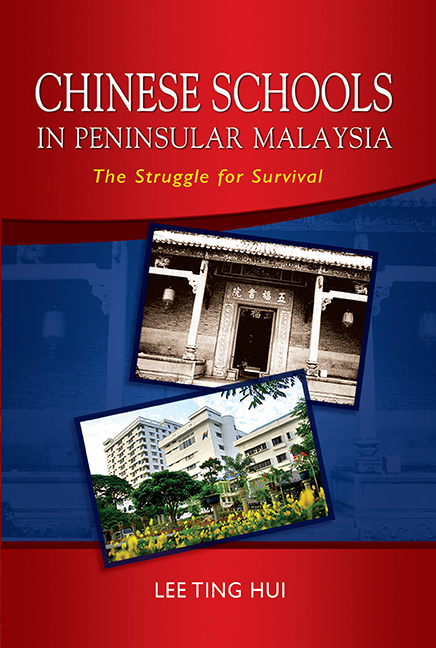Book contents
- Frontmatter
- Contents
- Acknowledgements
- Abbreviations
- Notes on Coverage and Names
- Introduction
- 1 The Years before the Pacific War
- 2 From the Japanese Occupation to Self-Government
- 3 Towards the “Ultimate Objective” of One-medium Education
- 4 One-medium Education under Rukun Negara and the New Economic Policy
- 5 The 1980s: A Decade of Continuing Challenges for the Chinese Schools
- 6 Vision 2020 and the Chinese Schools
- 7 Conclusion: Challenges and Responses
- Glossary
- Bibliography
- Index
- About the Author
4 - One-medium Education under Rukun Negara and the New Economic Policy
Published online by Cambridge University Press: 21 October 2015
- Frontmatter
- Contents
- Acknowledgements
- Abbreviations
- Notes on Coverage and Names
- Introduction
- 1 The Years before the Pacific War
- 2 From the Japanese Occupation to Self-Government
- 3 Towards the “Ultimate Objective” of One-medium Education
- 4 One-medium Education under Rukun Negara and the New Economic Policy
- 5 The 1980s: A Decade of Continuing Challenges for the Chinese Schools
- 6 Vision 2020 and the Chinese Schools
- 7 Conclusion: Challenges and Responses
- Glossary
- Bibliography
- Index
- About the Author
Summary
After the general election and the racial riots of 1969, with Abdul Razak replacing Tunku Abdul Rahman as the leader of the nation, things took a radical turn in the country as observed. The Malays found Tunku Abdul Rahman to be too compromising with the Chinese, and his successor adopted a more pro-Malay attitude than him. Yet, at the same time, Abdul Razak did not seek to squeeze out the non-Malay communities altogether. In fact, he sought and worked out a better understanding with them.
On the pro-Malay side, Abdul Razak took measures to ensure the political dominance of the Malays in the country could and would not be challenged again. He had a national ideology, called the “Rukun Negara” or “Articles of Faith of the State”, promulgated which defined the political orientation of the country for years to come. Next he made parliament, when it was reconvened, to pass legislation to bar all sensitive issues, that is, issues pertaining mainly to the special position of the Malays, from public discussion. He also initiated a New Economic Policy which sought to improve the economic lot of the Malays vis-à-vis the other communities radically.
As for forging a more workable modus vivendi especially with the non- Malay races, he enlarged the Alliance Party into a Barisan Nasional to include some of the opposition parties, which eroded the voter support of the MCA in the general election. He also extended a friendly hand to the PAS, which ate into the base of UMNO itself.
In line with the grim determination to put beyond the pale any questioning of the political dominance and intensified efforts to better the economic position of the Malays, an even more decisive thrust was made in the education field to realize the ultimate objective of a one-medium schooling. On this occasion, English-medium schools were to bear the brunt of the offensive.
- Type
- Chapter
- Information
- Chinese Schools in Peninsular MalaysiaThe Struggle for Survival, pp. 118 - 154Publisher: ISEAS–Yusof Ishak InstitutePrint publication year: 2011

